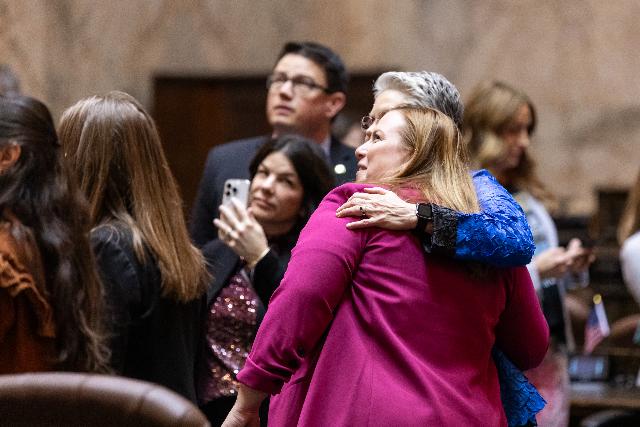Dear friends and neighbors,
The 2024 legislative session is a wrap! It concluded at 5:49 p.m. on March 7 and I’m now back home in Blaine working on issues important to you right here in our communities in Whatcom County.

Protecting Reproductive Rights
Before this year’s session concluded, I introduced two bills pertaining to reproductive freedom. As March is women’s history month, I thought it was both fitting—and infuriating—that it was necessary to introduce bills to protect our reproductive freedom. These bills include House Bill 2500 that aims to protect assisted reproductive services, such as in-vitro fertilization (IVF), and House Bill 2502, which promotes reproductive autonomy by protecting access to contraceptive methods.
I felt it was necessary to introduce these bills based on the recent Alabama Supreme Court decision that ruled that frozen embryos are children under Alabama state law, a decision critics said is having sweeping implications for fertility treatment in that state. As it turns out, Washington law is currently silent on this matter and needs to be addressed to protect our reproductive rights.

As a woman who experienced infertility, and as a social worker and therapist who has walked side by side with many others who have too, I know that the decision to go through IVF most often happens because there are no other choices left. Instead, it is the last hope to have a baby. The experience is tied up in grief, loss and often desperation. It is all-consuming, expensive, utterly exhausting, and takes a sledgehammer to a woman’s mental and physical health.
The infertility experience is not a unique one. In fact, one in six Americans experience the repetitive crush of disappointment in their desire to have children. Almost immediately upon this ruling, the impact created ripples across the state. It also led to the fear of the loss of freedom for women around the world. The repercussions are being felt nationally and globally.
Immediately upon the Alabama ruling, the state’s largest hospital system announced it would pause IVF treatments while hospital officials evaluate whether patients undergoing IVF or doctors performing the treatments could face criminal charges or punitive damages.
If the Dobbs decision wasn’t enough, the most recent ruling in Alabama that found that embryos were to be considered the same as live children should be the wake-up call that anyone who was unsure needed. This is not just about IVF. This is about controlling reproductive choice.
If embryos are considered children, then from the moment of conception all women who have an embryo inside them could be subject to an unlimited number of accusations and punishments for behavior while carrying an embryo. These accusations could include child abuse, manslaughter or even murder charges for virtually anything that they do that might be construed as harmful to that “child”
Further, if embryos and fetuses are children, would a woman who is pregnant, or suspected to be pregnant, have a right to do things that might endanger the embryo in a situation where an embryo is her legal equal? Could she risk this embryo’s health and life by eating sushi, cleaning the cat litter box, going for a jog? What about lifting something heavy? Having some soft cheese?
This legal case has raised questions about the definition of “child” or “personhood,” while the global medical and scientific community concedes that is that embryos are cells capable of creating life rather than consisting of actual life.
The reality is though, that many embryos never make it through to the birth of a child. Miscarriage is so common, there is popular advice is to refrain from announcing a pregnancy. Many embryos naturally never even implant, and they leave a woman during normal menstruation, unbeknownst to her. Are all of these to be considered the death of a child—to be investigated and possibly prosecuted?
These scenarios might sound dramatic, but they are not hypothetical or distant. In Alabama, IVF clinics have almost immediately stopped services and hopeful couples are left in limbo between series of shots and procedures and now in chaos and uncertainty, have once again put their dreams of a healthy pregnancy on hold. In Washington state, we are committed to continuing to protect your freedom to have a family, and why I introduced HB 2500 before this session concluded. It is possible and necessary to separate spiritual beliefs from legal protections. We must understand that we cannot legally regulate a person’s medical and personal choices without grave threat to our freedom. Government has no place in the most personal decision a woman makes. It is unsafe for the woman and a grave and immediate threat to her safety and freedom as an American and Washingtonian.
Despite attacks from the national level, Washington has a history of enacting the full gamut of reproductive health care choice protections in the country; and with the introduction of these two bills (HB2500 and HB 2502), I will work to continue to protect your right to choose a family however you choose. I will continue to fight for you on these important issues going forward.
Questions? Feel free to reach out to me anytime. In my next newsletter, I will let you know where I requested state dollars for projects here in our communities. Look for this budget newsletter in about two weeks’ time.
Best wishes,

